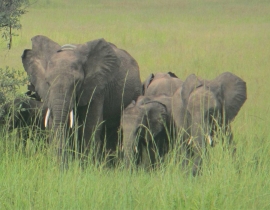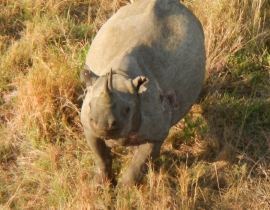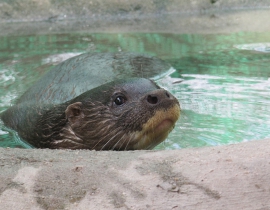Posted June 16, 2015 in Africa
 The Elephant Orphanage Project in Zambia has entered a very exciting phase in the programme, with the Release Herd elephants suddenly showing an increased interest in being released!
The Elephant Orphanage Project in Zambia has entered a very exciting phase in the programme, with the Release Herd elephants suddenly showing an increased interest in being released!
For the past two years Chodoba (now 10 years old), the oldest elephant in the orphan herd has been free-roaming around Camp Phoenix but has never wandered much more than a few kilometres from the safety of the Release Facility, where he has been raised since he was 2.5years old.
Chodoba always seemed interested in wild elephants and enjoyed the night-time freedom of wandering around the Park but he was clearly not confident enough to go too far. However in the past few months Chamilandu (now 9 years old) the oldest female within the orphan herd has started to show signs of oestrus and this was seemingly coupled with a desire to wander! With Chamilandu as his sidekick, Chodoba had no qualms in adventuring further afield and after heavy rains caused flooding at Camp Phoenix the two took off on a 50km round trip that took them 13km away from Camp and out to the shores of Lake Itezhi-Tezhi. Since neither orphan had ever ventured further than 3km in the past, it is likely that they were following wild elephants to the rich grasslands of the Lake shore.
The EOP was able to track the movements of the elephants foray via a GPS satellite collar fitted to Chodoba. Luckily the two elephants stayed together and when they finally returned to their home territory 8 days later they were greeting with huge excitement by the remaining orphan herd. Chamilandu’s disappearance with Chodoba was quite a shock since she is the matriarch of the orphan herd and in particular has a very close bond with Rufunsa (who is a small 6 year old orphan) with whom she had previously been inseparable. After a few days with their surrogate family the adventurous two took off on another exploration for 22 days into a different part of the Park. Data from our research team suggests that Chodoba and Chamilandu were either moving amongst wild herds or following their well worn pathways – all very encouraging signs for these orphaned elephants to eventually live independently back in the wild.
Since this time Chodoba and Chamilandu have embarked on a further few jaunts away from the Release Facility but after three months Chamilandu has settled back into life with the orphaned herd – it is possible that the hormonal changes she has evidenced were the cause of her initial interest to roam further afield. Without the support of Chamilandu for long excursions Chodoba was then found to be spending his time close to the camp and the other orphans, really indicating that he needs the company of another elephant (and preferably one he knows well) to head off into more unknown territory.
Despite Batoka (nearly 8 years old) being the most likely candidate for this role it was when a surprise and a worry for EOP when Kafue (6 years old) decided to disappear with Chodoba on his next venture!
The two males have not been back to Camp Phoenix since the 8th May and interestingly have not even associated with the orphan herd whilst out on walks. Much to our research teams delight they did choose to sleep on the termite mound by their tent for one night, but have since not returned. Chodoba’s collar has indicated a few times that the he has been very near to the orphan herd during the day, but they have not approached their surrogate family. The young bulls have together travelled further than Chodoba had ventured before and have reached up to 37km from Camp, approaching the communities that border the National Park. On 19th May our Post-Release Monitoring team tracked the two on foot to determine that they were healthy and still together, since only Chodoba is satellite collared. The report was positive but it really highlighted the importance of getting a collar for Kafue since we cannot assume he will always stay with Chodoba.
With many thanks to IFAW who provide major funding and technical support to the EOP, another three satellite collars are now being purchased so that we may ensure that the movements of Chodoba, Chamilandu and Kafue are continuously tracked. These new more advanced collars will be able to give greater information about the proximity of the collared elephants to each other as well as provide feedback alerts to EOP when the orphans approach predetermined GPS locations/areas, which will give us a greater understanding of their movements and behaviour out in the wilds of Kafue National Park.
At the end of the month, Chodoba and Kafue briefly returned to the camp, but only to collect another young male, Batoka, eight years old, during the orphans’ daily walk. It is very exciting times for the Elephant Orphanage Project (EOP) staff as they are observing the movements of Kafue National Park’s newest bachelor herd.



